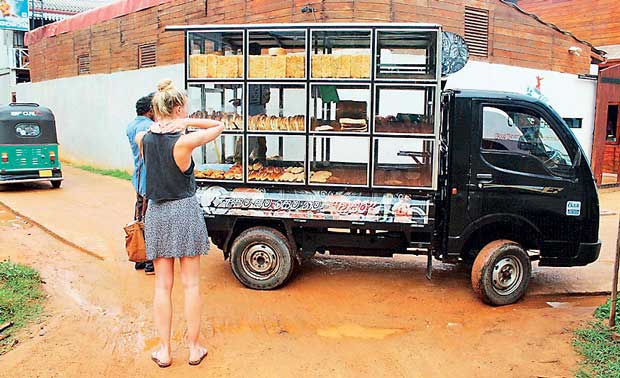Reply To:
Name - Reply Comment
 An economist has criticized the government’s tax policy on vehicle imports and the recent credit restrictions imposed on vehicle financing, calling them detrimental towards inclusive growth as such policies deprive access to a three-wheeler or a mini-truck by the butchers, bakers, plumbers and the like, who create economic wealth
An economist has criticized the government’s tax policy on vehicle imports and the recent credit restrictions imposed on vehicle financing, calling them detrimental towards inclusive growth as such policies deprive access to a three-wheeler or a mini-truck by the butchers, bakers, plumbers and the like, who create economic wealth
An economist has criticized the government’s tax policy on vehicle imports and the recent credit restrictions imposed on vehicle financing, calling them detrimental towards inclusive growth as such policies deprive access to a three-wheeler or a mini-truck by the butchers, bakers, plumbers and the like, who create economic wealth.
Hence, according to Murtaza Jafferjee, the Managing Director of JB Securities, a Colombo-based equity brokerage and a research house, such restraining policies on vehicle imports will drive the underprivileged segments into poverty and will also create social pressures because one who bought a mini-truck before the budget (2017) is significantly better-off than a person who could not purchase a truck.
The budget 2017 imposed a minimum excise duty of Rs.1.0 million for mini-trucks, which is a three-fold increase. On top of that, the Monetary Board imposed a 25 percent loan-to-value ratio on three-wheeler financing, jacking up the average initial down payment on three-wheelers from Rs.200, 000 to Rs.485, 000.
As a result, only 903 three-wheeler registrations were recorded in February, still high but significantly down from 3,327 units in January. The mini-truck registrations fell to 298 units from 559 units.
As per the data compiled by JB Securities, monthly three-wheeler registrations averaged at 6,000 units a month while mini-trucks averaged at 1,400 a month in 2016. According to Jafferjee, both types are used mostly by micro-enterprise owners operating with less than 5 people in creating higher economic growth.
“An integral capital input for a micro enterprise is a basic utilitarian vehicle such as a three-wheeler and/or a mini lorry—(where) the marginal return to capital is very high.
A baker who has access to a mobile retailing unit through a modified three-wheeler or mini truck enjoys much greater sales – carrying and displaying capacity is greater, radius of travel is 10 times more, alternator can charge the battery that can power a fan or food warmer, etc.
The bottom line (is) the current vehicle taxation policy is detrimental towards greater inclusive development and impedes higher economic efficiency by distorting the market for vehicles. Continuing with such a policy will have electoral repercussions,” Jafferjee said in his monthly analysis on vehicle registrations.
To prove his point, he compared the taxes paid in Sri Lanka and the Philippines—a similar lower middle income country with high population density and theatrical politics— on popular Toyota hybrid vehicles.
In the comparison he showed, Sri Lankan car buyers are paying between 26 -175 percent more taxes for a car. He also said per capita GDP in Philippines is US $ 3,000 whereas in Sri Lanka it is US $ 4,000.
The per capita GDP comparison however suggests Lankans could afford to pay a higher excise duty when importing a car than Filipinos.
In this context, Jafferjee calls for the imposition of early sunset clauses on tax holiday periods enjoyed by firms earning super profits rather than imposing a higher burden on the economically underprivileged through indirect taxes, if the government wants to increase its revenues.
Alternatively he also proposed to increase the fuel prices to reduce the demand and/or the re-imposition of the fuel price surcharge above the life line rate on electricity due to the drought.
Through these proposals, Jafferjee appears to be fine with the entire population being slapped with additional fuel or electricity to compensate government inefficiencies, to provide an easy passage for a few to buy three-wheelers and mini-trucks under the guise of micro-enterprises who create mayhem when using the roads, risking the lives of others and their own. Jafferjee also proposed to resume priority lanes for buses and also to impose congestion fee to control the massive influx of vehicles daily into the Colombo city.
“In conclusion, inability to widen the tax net is not a reason to create a highly distortionary vehicle taxation system. It deprives choice, distorts the playing field and is unfair for those who pay their fair share of taxes – the highest marginal tax rate on PAYE has been increased from 16 percent to 24 percent from April 1. If people pay their taxes, it’s only fair that they can buy a vehicle of their choice at a reasonable price” he said.